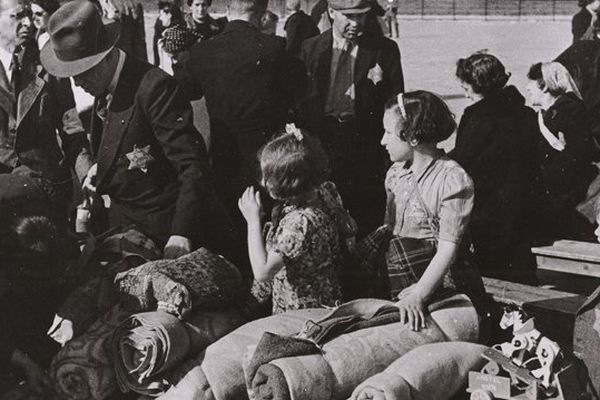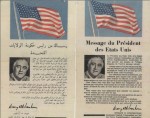Entire Jewish families were rounded up and interned in the Vel d’Hiv and other places in France, when La Grande Rafle began on July 16, 1942. (unattributed image)
It is 80 years this summer since La Grande Rafle (the Great Roundup) took place in France. It is not only a significant, tragic anniversary for the Jewish people, but one that impacted me directly.
“Happy like God in France” was a saying sometimes heard among Yiddish-speaking Jews of Eastern Europe a century ago, even though antisemitism was fairly widespread in France and few years had passed since the Dreyfus Affair. Falsely accused of selling military secrets to Germany, Capt. Alfred Dreyfus was publicly humiliated and sentenced to Devil’s Island in French Guiana. However, in the end, justice prevailed: Dreyfus was proven innocent and restored to his rank. Jewish loyalty to France remained unshaken. In 1939, as in 1914, Jewish men, citizens and immigrants alike, volunteered to fight in the defence of France, but the country for which they spilled blood betrayed their trust.
The humiliating defeat of 1940 led to the division of the country into two main zones, a Germany-occupied zone in the north and a so-called “free zone” in the south. It also led to the collapse of democracy and a replacement of the republic with a fascist regime, called Etat Français, in Vichy, headed by Marshall Philippe Petain. That regime enacted the sweeping antisemitic Statute des Juifs, the most racist legislation in occupied Europe. Its application was entrusted to a special commissariat for Jewish affairs, of which the first incumbent was Xavier Vallat, who declared to the younger hauptsturmführer (captain) in the SS, Theodor Dannecker, in Paris, “ I am an older antisemite than you are: I could be your father in these matters.”
Vallat was soon replaced by the more vicious Louis Darquier de Pellepoix, a gutter journalist, who, as early as 1937, proposed in one of his screeds to “solve the Jewish problem in France” by wholesale extermination.
At the time, there were 300,000 Jews living in France, who represented less than one percent of the population. Their origins were diverse; Ashkenazim, Sephardim, immigrants from a variety of European and Mediterranean countries, religious and non-practising, etc. That population was composed of native and naturalized citizens. The Census of 1940 placed French Jews under the protection of the Vichy government, while at the same time expelling them from the professions, civil and military. Non-naturalized Jews were liable to internment at the discretion of regional police prefects. Instinctively respectful of the laws of France, even Jews who bore French surnames and spoke fluent French obeyed the order to register.
The regime created a Gulag-type network of internment camps that covered both major zones of the country. Beginning in 1941, Jewish men were summoned by groups, depending on their nationality, to present themselves at the police commissariat nearest to their places of residence (there were no ghettos in France). They were sent to hard labour in camps, of which the most notorious were Pithiviers and Beaune-la-Rolande, northeast of Orléans, and Drancy, a transit camp in a suburb of Paris, from where departed the deportation cattle car trains bound for Auschwitz. Naturalizations granted after 1927 were ordered rolled back.
Beginning on July 16, 1942, a dramatic change in the deportation policy was initiated: La Grande Rafle. Entire families were now targeted, regardless of age or sex. Beginning at 4 a.m., police squads bearing lists of the names and addresses of about 27,000 Jewish immigrants fanned across Paris in vans and requisitioned urban buses, knocking at countless apartment doors. About half of the targeted victims, warned by the Jewish communist underground, were able to escape arrest and find shelter among gentiles, mainly in rural areas. Arrested during that roundup were 3,118 men, 5,019 women and 4,115 children (3,000 of them born in France and, therefore, French citizens).
The Grande Rafle, codenamed by the police Vent Printanier (Spring Wind), was the greatest mass persecution in the city of Paris since 1572, when thousands of Protestants were murdered on the night of St. Bartholomew by Catholic mobs unleashed by Queen Catherine of Medici.
The 1942 military-style operation against the Jews in Paris was carried out from start to finish by French policemen, with no German participation, as they did not have sufficient resources. In fact, the Germans had ordered the French not to arrest children below the age of 16 for the time being, since, as stated, 3,000 of them were born in France. However, then-prime minister of France Pierre Laval averred that it would be “inhuman” to separate children from their parents. On his own initiative, he declared that he assumed the burden of “ridding France of its Jews.”
Laval ordered that entire families be rounded up and, pending deportation to the east, interned in the Winter Circus (Vel d’Hiv), Drancy, Pithiviers and Beaune-la-Rolande. Conditions of interment in the Vel d’Hiv were hellish: suffocating heat, the stench of public latrines, next to no medical attention, and scant distribution of food and drink. Many people went mad, some died. In the end, families were split all the same: adults were transported from Drancy to Auschwitz, while children initially sent to Pithiviers were next carried in the cattle car trains, along the same harrowing itinerary of death, with almost no adult supervision. Many of those children were brutalized by French policeman, who even robbed them of what their parents gave them.
One month after the Grande Rafle, similar atrocities were perpetrated in the free zone of the south, where there was no German occupation and the French government retained complete sovereignty over internal affairs, bearing no obligation other than supplying the Nazis with the products and produce that they demanded.
Caught when we illegally crossed the demarcation line, which divided France’s two major zones, my parents and I were among those “assigned to residence” in a requisitioned hotel of the small town of Lons-le-Saunier, near the Swiss border.
On the morning of Aug. 26, a rafle collected hundreds of Jews across the city, including my mother and me; happening to be on an errand, my father escaped. A pitiful column, we were marched across the city – hurried along by policeman who brutalized and insulted us, calling us “dirty Jews” – to the railway station, where a train awaited to transport us to the gruesome concentration camp of Rivesaltes, near the Spanish border.
The railway station became a scene of unrestrained police brutality, which spared neither adults nor children. I was seized by the hair and the seat of my pants by a brute who was about to throw me on the train, when I was saved by my maternal aunt, a French citizen, who, through personal contacts, obtained my release thanks to the timely intervention of a gendarmerie officer. I last saw my mother as she was being violently dragged along the floor of the station, then waved to me from a window, as the train departed for Rivesaltes. From there, with fellow victims of the rafle, she was transported several days later in a train that traveled north, this time to Drancy. And, there, she was squeezed into a cattle car train bound for Auschwitz. At least two-thirds of the women who left in that convoy either perished along the way, or were gassed following the selection on arrival.
Few of the Vichy regime organizers, policemen and other perpetrators of the summer 1942 and subsequent rafles paid for their crimes. Laval was tried and sentenced to death by firing squad in 1946; Petain was sentenced to life exile on a small island in the Atlantic Ocean; René Bousquet, chief of the national police, was briefly deprived of citizenship rights by General Charles de Gaulle and then resumed his functions, until he was mysteriously assassinated in his Paris apartment shortly before he was to be tried for crimes against humanity in 1980.
Obsessed by his wish for national reconciliation of the French, de Gaulle put a stop to any prosecution of persons who had collaborated with the Nazis. Throughout the postwar decades, the French deluded themselves with the myth that most of them supported or joined the resistance.
It was not until 1995 that then-president Jacques Chirac publicly declared that the opposite was the case – that “France had committed the irreparable,” that at least some financial compensation should be awarded to the survivors of the Holocaust, who had suffered or lost relatives to French collaboration with the Nazi action.
It should be noted, however, that nearly 75% of the Jewish population of France survived the Holocaust, thanks to the assistance offered by French citizens, both urban and rural, who sympathized with the Jewish people. Also, unlike Holland or Belgium, small, crowded countries, the French countryside offered vast areas of wilderness in which many Jews found shelter or joined the resistance.
René Goldman is professor emeritus at the University of British Columbia.


